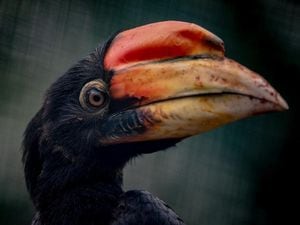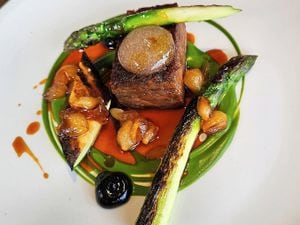WATCH: First rare hornbill chicks in UK for 13 years hatch at Chester Zoo
A zookeeper explained that it is ‘very rare’ to see the inside of a rhinoceros hornbill nest.

Hidden cameras have shown the first rhinoceros hornbill chicks to hatch in the UK for 13 years.
The female chicks arrived to parents Manu and Liv at Chester Zoo after an incubation period of around 40 days.
Zookeepers say the arrival of the chicks is made more “remarkable” as their parents were rescued from a fire at the zoo in December 2018.
The rarely seen film is at the heart of a new series of Channel 4’s The Secret Life of the Zoo.
Andrew Owen, curator of birds at the zoo, said: “It’s very rare to see the inside of a rhinoceros hornbill nest, as the incubation and rearing phase takes place inside a sealed cavity hidden high up in a tree.
“To be able to watch chicks on the nest and to be able to follow their development, from hatching through to fledgling, is incredibly special.
“These are the first of their kind to hatch at the zoo for 13 years and if the arrival of such rare chicks isn’t special enough, the backstory of their parents makes them even more remarkable.
“The adult pair was rescued from an awful blaze that broke out in the zoo’s south-east Asian monsoon forest habitat at the end of 2018. For the plucky pair to have gone on and have chicks so soon after is quite astonishing... it’s wonderful to have been able to watch the chicks grow and take flight for the first time.”
The rhinoceros hornbill is vulnerable to extinction in its native range in South East Asia, its wild number having plummeted due to habitat loss and illegal hunting.
Mike Jordan, the zoo’s Animal and Plant Collections Director, added: “It’s fantastic that the bird team at the zoo has been successful in breeding these new chicks. The work that we do to breed and protect hornbills, however, goes way beyond the boundaries of the zoo. Our bird conservationists are out in Malaysia where, alongside our partners, we’re helping the species fight off the threat of extinction as their rainforest home is being cleared to make way for unsustainable palm oil plantations.
“Part of this work involves the erection of artificial nest boxes which, in the absence of tall, cavernous trees that they would normally live in, provides the birds with suitable breeding conditions that they’re comfortable in.
“We’ve already seen the birds in the wild using our boxes to rear their young, giving a vital boost to their wild numbers.”
The chicks at the zoo hatched in May last year but remained sealed in their nest for two and a half months until they were ready to fledge.





